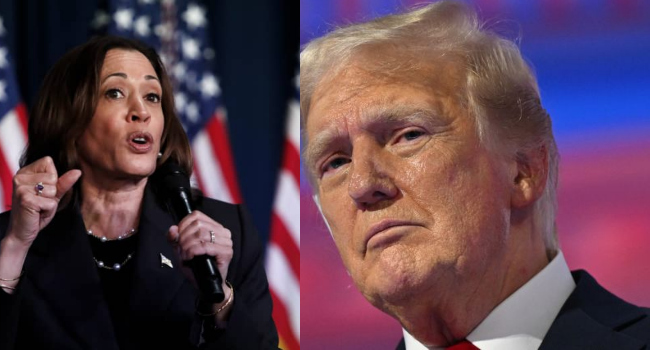US election: Americans prefer Harris over Trump to economic enhancement
TOPLINE Americans slightly favor Democratic presidential candidate Kamala Harris to lead the U.S. economy over Republican candidate Donald Trump, according to polling released earlier this week, reversing Trump’s lead over President Joe Biden in the same poll last month, though research indicates much more trust in Trump to improve individual finances.
About 42% of respondents identified Harris as the more trustworthy candidate to handle the U.S. economy compared to Trump’s 41%, according to the survey conducted for The Financial Times and the University of Michigan’s Ross School of Business released Sunday.
That is a notable shift from the six-point advantage Trump held over Biden in July, though Harris’ razor-thin lead is well within the poll’s 3.1% margin of error.
The same survey revealed 42% of Americans believe Trump will leave them better off financially, compared to 33% for Harris, the latest poll showing Trump with a big advantage in that regard after a CNBC survey released last week which found 40% of respondents believed Trump would leave them better off financially, compared to 21% for Harris.
Issue-specific polling between Harris and Trump remains light since Biden dropped out of the race July 21, but how Americans view Harris’ plan to address inflation—long a top issue for voters—will likely be crucial.
Prior polls found Trump held a double-digit lead on Biden in trust to navigate inflation, which hit its highest level in more than 40 years in 2022 before moderating.
CONTRA
A New York Times and Siena College joint poll released Saturday found 53% of voters trust Trump to do a better job on the economy, compared to 44% for Harris.
WHAT WE DON’T KNOW
Specifics on Harris’ economic policies. Though policy experts expect Harris’ economic plan to largely mirror the Biden administration’s, bolstered by her reported tapping of Biden’s former top economic advisor Brian Deese to build out her ideas, Harris has yet to release a platform. The current vice president told reporters Saturday she will roll out her broader agenda “focused on the economy and what we need to do to bring down costs and also strengthen the economy overall” this week. Perhaps Harris’ most clear break with Trump on the economy is her “strong” disagreement with him on direct presidential oversight of the Federal Reserve, the U.S. central bank which determines monetary policy, most notably influencing interest rates and whose governors are appointed by the president but historically act independent of the executive branch. Trump said last week he believes “the president should have at least say” on rates, while Harris maintained she would “never interfere” with decisions made by the “independent entity” Fed.
KEY BACKGROUND
Trump’s economic plan has largely focused on deregulation in the energy and financial industries, touting the much-better inflation during his presidency than Biden’s, and instituting significant tariffs on Chinese goods. The U.S. economy performed very well under both Trump and Biden by most metrics, with historically low unemployment, strong stock market performance and steady economic output growth occurring during both administrations, save for a 2020-21 global blip during the depths of the COVID-19 pandemic (see here for detailed data on how the economy fared under Biden and Trump). The president often has a less direct impact on the U.S. economy than public perception may suggest, considering the difficulty in implementing policies, the global nature of the economy and the fragile nature of the stock market, which ultimately relies on earnings growth for multinational corporations.
HOW COULD STOCKS REACT TO TRUMP OR HARRIS WINNING?
Though presidential impact on stock prices is often negligible in the long run, strategists suggest it’s likely that stocks in sectors like banking and oil production would get a boost from Trump, while companies which rely heavily on manufacturing in Taiwan (like semiconductor chip maker Nvidia), or on sales in China (like Apple), could be hurt due to Trump’s policy in the region.


